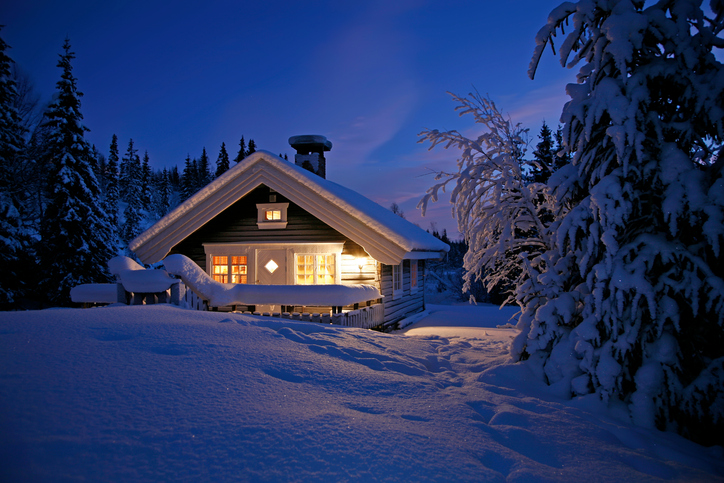lodge
(noun, verb)
/lɑdʒ/
 LISTEN
LISTEN


A lodge is a house or cabin used by hunters or hikers as a temporary place to stay. Nowadays, in US English, a lodge is a hotel or motel, usually in the mountains or near a forest. A lodge is also the meeting place of a certain organization and the members of that organization considered as a group. In UK English, a lodge is a small house or cottage at the entrance to a large estate. As a verb, to lodge means ‘to stay somewhere temporarily’ or ‘to receive someone as a guest in your house.’ To lodge also means ‘to be caught or come to rest in a particular position or place’ or ‘to stick.’
Example sentences
- When the family goes hunting, they stay at their lodge in the woods.
- Amanda likes to stay at fancy lodges when she goes on vacation in Colorado.
- There is a club meeting at the lodge tonight.
- The duke walked from the main house down to the lodge to speak to his gardener.
- When I was a student, I lodged with a family who lived near my college.
- The young couple decided to lodge foreign students to bring in some extra income.
- John's hat blew off and lodged in a tree.
Words often used with lodge
lodge something in: put something in a tight place, or get something stuck. Example: “I can’t get the broccoli out of my teeth. I really lodged it in there.”
lodge a complaint: file a complaint. Example: “if you’re not happy with the service, you can lodge a complaint with the management.”
In pop culture
A Masonic lodge is a group of Freemasons. The Freemasons are a society, originally made up of stonemasons, who offer each other mutual support. Nobody who is not a Mason really knows what happens in the society, but it is commonly believed that those who join have to undergo an initiation ritual. In one episode of the Simpsons, Homer wants to join the local lodge of the “Stonecutters” and you can watch a clip here showing the rites he has to undergo:
Additional information
The related word lodging refers to a place where you can stay temporarily. Example: “Have you arranged the lodging for your trip yet?” In the plural, lodgings refers to more permanent accommodation. Example: “I arrived in town a few days before my job was supposed to start so I could secure lodgings.”
Did you know?
As mentioned above, in the UK, a lodge is a small house or cottage, often at the entrance of a large estate. Related to this meaning, in British universities, the lodge is also the room, normally at the entrance to a university or college building, used by the porters. Traditionally, a porter is a gatekeeper (the kind of person who might live in a lodge on a grand estate, keeping out undesirable people), but in modern day usage at a British university, the porters are the people who deal with general enquiries, mail, and caretaking duties.
Other forms
lodger (noun), lodgeable (adjective)
Origin
Lodge dates back to the late 12th century. The Middle English noun logge, from the Old French loge, can be traced back to the Proto-Germanic root laubja-, meaning ‘shelter,’ which itself possibly comes from the same Proto-Indo-European root as leaf, leub(h). Some linguists think that this means that the original meaning was ‘shelter under foliage,’ such as trees. It is related to the Old High German louba (porch, gallery) and the modern German Laube (bower or arbor). The Germanic origin also gave us the Medieval Latin laubia or lobia (covered walk in a monastery), from which lobby comes. The verb, originally meaning ‘to give shelter or encamp an army,’ comes from the noun, and first appeared around the year 1200. The wider meaning, ‘to provide temporary habitation,’ was first used in the late 13th century.
Word of the Day is released Monday through Friday.



